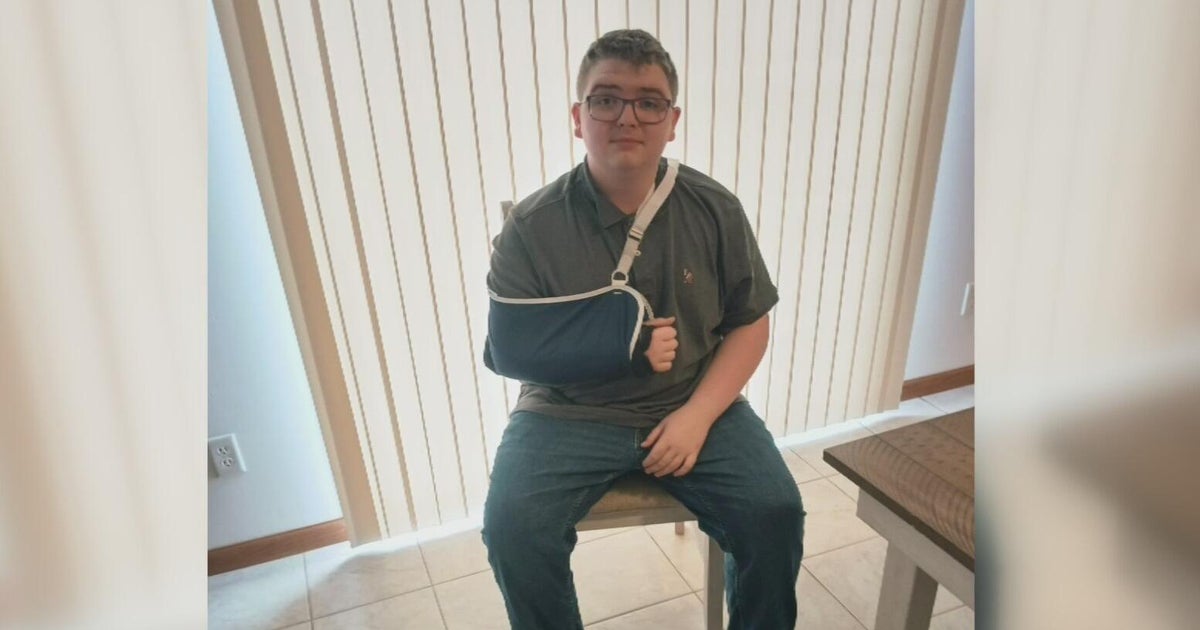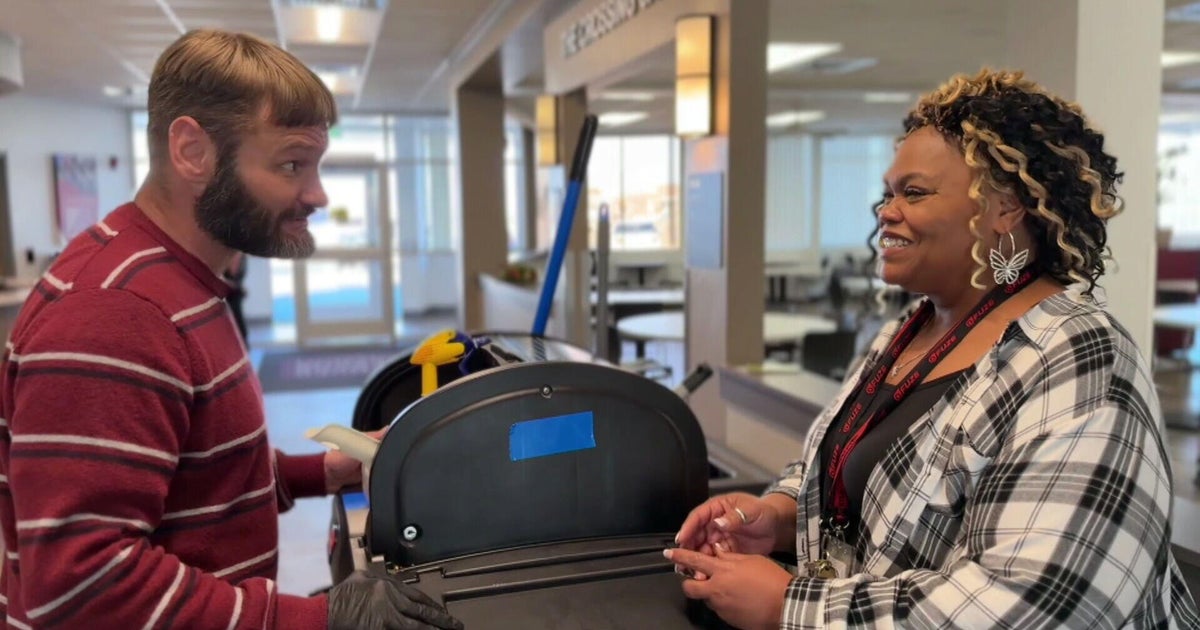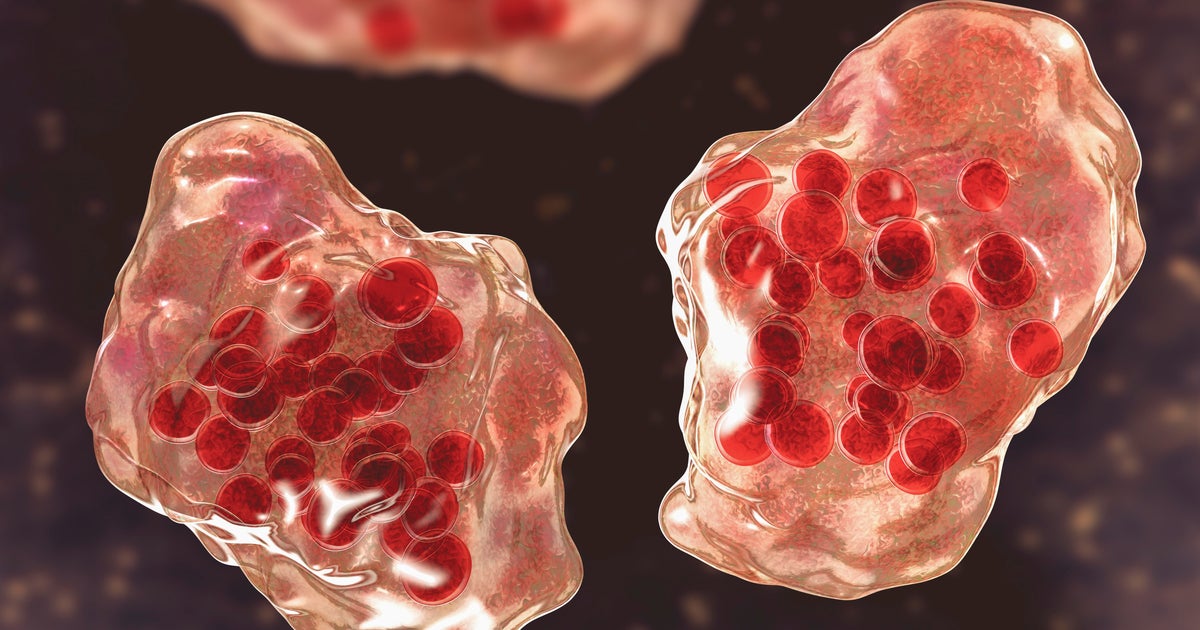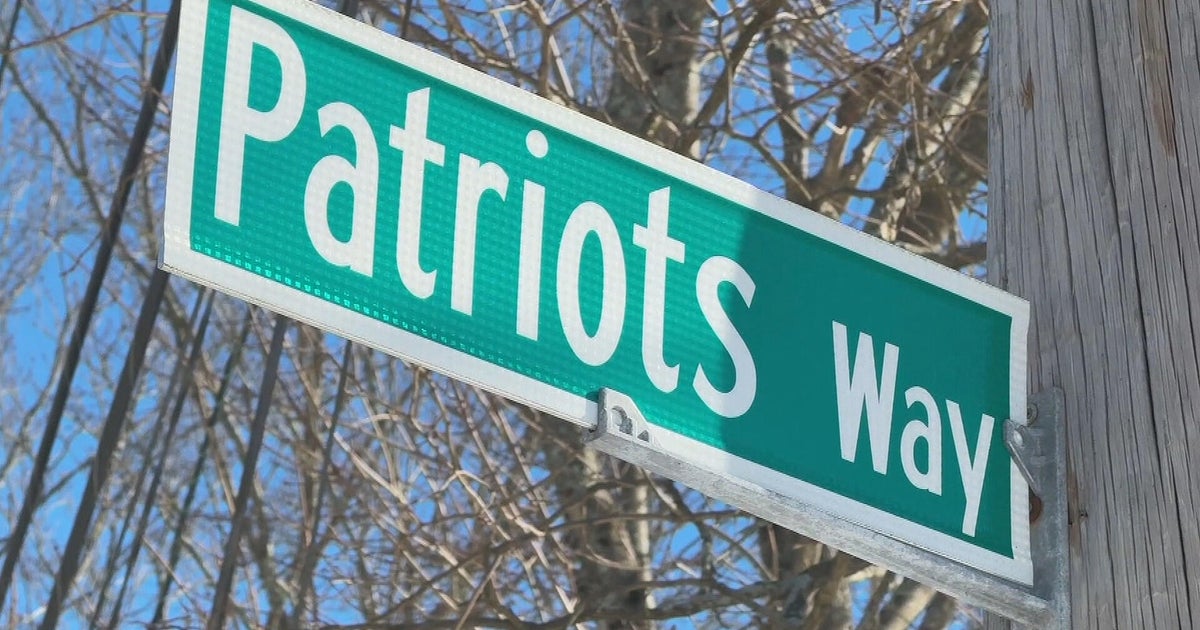Minn. Nursing Home Program Minimizes Medication
DULUTH, Minn. (AP) -- Superior native Stanley Keller has lived in a Park Point nursing home for 21 of his 57 years, but he hasn't forgotten his favorite football team.
Keller's room at Ecumen Bayshore Health Center is decorated with every imaginable Green Bay Packers keepsake. He wears a Packers jersey, and parks his wheelchair under a Packers-fans-only sign in a second-floor hallway of the nursing home.
Keller has Huntington's disease, a brain disorder with a range of symptoms including dementia. And he's part of a pilot program in the Ecumen system designed to give him a little less medication and a lot more personal attention.
On a recent afternoon at Bayshore, Keller was getting face time with Tom Cline, a "restorative aide." He grinned from ear to ear as Cline gently massaged his hands with lotion and then held up a hand for him to kick.
The program is Awakenings, now in use at 15 nursing homes owned by Ecumen, a Twin Cities-based nonprofit. The idea is to wean residents, especially those with dementia, off nonessential drugs that might be robbing them of their personalities and harming them physically.
Keller takes a daily dose of haldol, an antipsychotic drug. Before Awakenings was implemented four months ago, Keller was given additional doses "as needed" when "out-of-character" behaviors occurred.
Now, if those episodes occur, Bayshore responds with human help.
"It's about enhancing quality of life," said Maria Alseth, a registered nurse who is Awakenings project leader at Bayshore. "When you take medications that could sedate, that could take away your functional abilities and your ability to interact with your environment, you're decreasing the quality of life that the client may have otherwise."
Laurel Baxter, who directs Awakenings for the Ecumen system, said use of psychotropic medications is similar to the abandoned practice of using physical restraints.
"If you see a person, be it a resident or even one of your family members, and they're agitated and they're upset, it's easy in our society to look at giving a pill to treat something," Baxter said.
Bayshore resident Patricia Lagine used to shuffle her feet when she walked.
"When I'd take her out I thought she was going to trip, because she couldn't pick her feet up," Florence Lapcinski said of Lagine, her sister.
Lagine, who is 61 and has dementia, can walk normally again -- because she's taking less medicine.
Awakenings began on a small scale at Ecumen Scenic Shores Care Center in Two Harbors with Eva Lanigan, then the resident care coordinator. Lanigan said she came back from a seminar in 2009 with a question: "How can we provide residents with behavioral interventions and modifications instead of medicating them?"
Officials and staff at Scenic Shores were open to a new approach, said Lanigan, who is now director of nursing. "We found that when we took away the medications and implemented exercise and activities . that worked well," she said. "We saw a large increase in their quality of life and a decrease in their medications, and we let their personalities come out."
Scenic Shores became a noisier, livelier place, Lanigan said.
Ecumen officials took notice. So did the Minnesota Department of Human Services, which OK'd a $3.8 million, two-year grant to expand it to Ecumen facilities that use Medicaid funding. It doesn't apply to Ecumen Lakeshore in Duluth, which isn't a Medicaid facility, Baxter said.
The program was given the name Awakenings because a goal is to restore patients' personalities as they emerge from a medicine-induced fog. The title wasn't inspired by Dr. Oliver Sacks' book of the same name, or the movie the book inspired, Ecumen officials say.
Doug Aretz, director at Bayshore for just under a year, said Awakenings is a response to a greater problem.
"We are in a society where we go to the doctor (and) we want a quick fix," Aretz said. "It's been proven that it's not the best way. It hasn't given us the results that we need."
That doesn't mean doing away with medications altogether, Alseth said. But someone who is mourning the death of a loved one doesn't necessarily need an antidepressant. Relaxation techniques at bedtime can be a better method of dealing with insomnia than pills.
So someone has to be available to listen to the resident who's in mourning, or to help the sleepless resident relax.
"It is more staff time," Aretz said. "We're putting face time and human intervention back into the program, back into care."
It's the right approach, said Dr. Deborah Reed, a geriatric psychiatrist and assistant professor in the Department of Psychiatry and Behavior Sciences at Northwestern University's Feinberg School of Medicine.
"I think that's actually an excellent initiative, and I support it wholeheartedly," Reed said. "We always try to use medication for behavioral disturbances in dementia as a last resort. . Any technique that helps a patient feel contained, calm and safe is of tremendous benefit for patients with dementia."
But offering that kind of personal treatment requires a bigger staff, Reed said.
At Bayshore, which has 160 beds, it meant bringing back Alseth from another assignment with Ecumen. It also meant hiring four nursing assistants also known as "restorative aides." Each nursing assistant works with 13 to 15 residents on a shift, Alseth said.
"It's revolutionized the way I do things," said restorative aide Cline, 29, who has been a nursing assistant for about six years. "I can do more individual care. I can spend more time with the residents. And I get to be extremely creative."
One recent morning, for example, Cline worked with a resident who wanted to wash dishes and cook. He filled that need by helping her make a sandwich.
All of the Ecumen facilities in the program had to hire a leader and nursing assistants, Baxter said -- one reason the state grant plays a key role.
Aretz said he hopes something like Awakenings will become standard in all nursing facilities, but to do so will require adequate funding once the grant runs out. "We really can't go far down that road unless we're reimbursed adequately, and today, we're reimbursed $25 per day less than what it costs to care for that Medicaid person," he said.
Some residents' families welcome the change; others don't.
"You have families that absolutely don't want their loved one to receive a psychotropic medication, and others that if they have been successful with -- in their minds -- with a pill, they don't want to discontinue it," Baxter said.
Lapcinski, 71, attended meetings about Awakenings and decided it would be a good change for her younger sister, who suffers from the effects of fetal alcohol syndrome. "I just don't really think that she needed all that (medication)," Lapcinski said.
But decreasing the use of psychotropic medications goes against the grain of current thinking, and it could encounter well-funded opposition, Aretz said.
"It's the powerhouse of the pharmaceutical companies that are in play here," he said. "(It goes) back to the mentality in America, which is the quick fix. It takes longer to figure out the root cause of a condition and what's making those behaviors happen as opposed to a pill taking hold in 15 minutes."
By JOHN LUNDY
Duluth News Tribune
(© Copyright 2011 The Associated Press. All Rights Reserved. This material may not be published, broadcast, rewritten or redistributed.)







